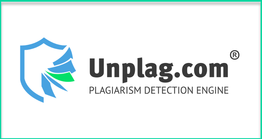
The point is that free checkers can hardly afford a powerful parser that would systematically crawl websites to guarantee precise comparison and relevancy of original sources. They cannot collect a massive database of digitized academic sources (journals, publication, etc.) for the same reason. What they do offer to users is a primitive submission check with irrelevant sources list. Obviously, academic institutions need something far more reliable and effective.
The paid alternatives available for Canvas users are many. And there’s one that is worth mentioning here - Unplag.com. The Unplag team has been quite active lately by posting about new features and system updates. So, let’s dig into details.
Some general facts about Unplag
Unplag is a smart technology helping detect and prevent plagiarism. It first appeared on the market in 2014 to meet the needs of educators and students. The team behind the project keeps on collecting user feedback and implementing the updates.
Now, Unplag can check student submissions for originality not only in English and Spanish, but also French, German, Greek, Turkish, Norwegian, and more languages. It recognizes most generally used academic writings styles like Harvard, MLA, APA, and Turabian allowing to skip correctly cited sources and obtain more relevant similarity index.
Unplag compares papers with the internet, academic repositories, and peer submissions. The Unplag team aims at simplifying user workflow and is working jointly with Canvas on a new integration framework. Thanks to this users will have a chance to enable the checker for any assignment in one click. This new improvement is also said to support all essential SpeedGrader features and Crocodoc too (to comment on student assignments submitted via Canvas).
Unplag integration with Canvas
Unplag integrates with Canvas via “External tools” menu like LTI app. When selecting Unplag as an external app, an academic institution's administrator can either make it accessible to the whole campus or to a particular course.
Optionally, Unplag can be integrated manually (Unplag supports all standard setups offered by Canvas). After the checker is installed, no further maintenance is required, since Unplag operates in the cloud. For this reason all system updates or newly released features become immediately available for all current users of the tool. For more details on how to get it ready for use, click here.
As said above, Unplag together with Canvas are going to make a new integration go live in 2017. Once it is tested, Canvas users will be able to try it out.
Teacher workflow with Unplag in Canvas
To enable Unplag for a specific assignment, educators should select Unplag in the External tools menu. Before students receive the assignment, educators can adjust the system settings. They include:
- omitting properly formatted references and citations from comparison results (since they shouldn’t be considered as plagiarism),
- choosing one out three suggested checking types,
- allowing students to submit drafts for check prior to final submission,
- skipping matches by percentage or number of words,
- hiding similarity search results from students.
Right after the assignment settings are selected and saved, students will get it the usual way it happens in Canvas. Once papers are submitted, Unplag checks them automatically and delivers reports for each work. To view the report, an educator simply should go to the assignment page in Canvas and click on the student name and then on the report link. The Unplag report is shown as part of the Canvas assignment page.
Each Unplag report opens in the SpeedGrader with all its standard features supported (like grading assignments by rubrics). The report shows matching content, citations and references in different colors. If an educator thinks a student needs another try, it’s possible to enable the resubmission option.
Student workflow with Unplag in Canvas
When using Unplag, students also follow standard workflow in Canvas. To submit papers, students should open the Unplag assignment (which is shown as another Canvas assignment in the Assignments section), upload files and confirm the submission.
If activated by educators, students can run a certain number of draft checks to ensure they cited all the sources. Students can also view detailed reports and comments (if educators left them). All the changes an instructor makes in the report will be displayed for a student too (for example, if some matching sources are excluded). Anyway, it’s up to instructors to decide whether to show reports to students or not.
Upcoming Unplag updates
In 2017 Unplag is going to expand its open access database, make it possible for instructors to switch from original formatting and plain text view of the checked paper, expand the number of the supported features in the assignment thanks to a new integration with Canvas, and many more.
It is worth mentioning that Unplag can also customize some features or the system functionality upon request and run bulk checks. The latter is done through the Unplag standalone version for free for the educators using Unplag within their school, college or university account. Thus, they won’t have to create assignments in Canvas for that.












